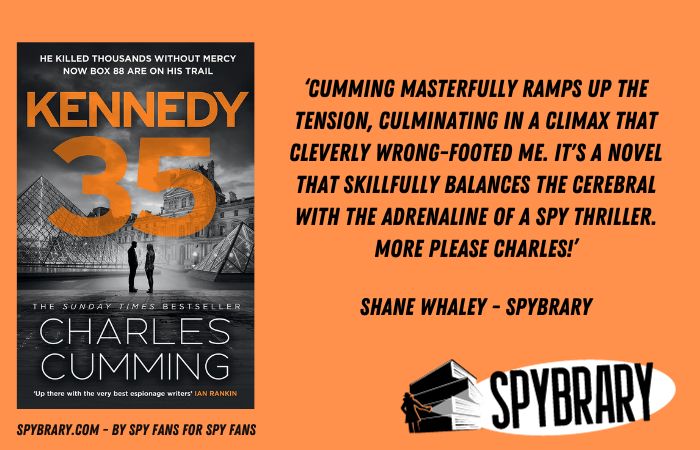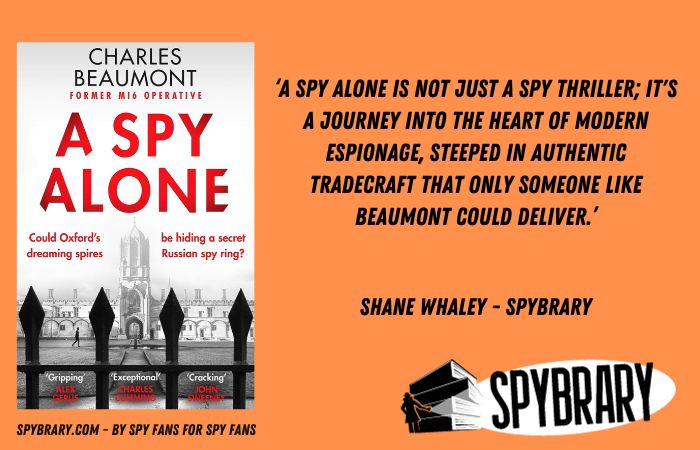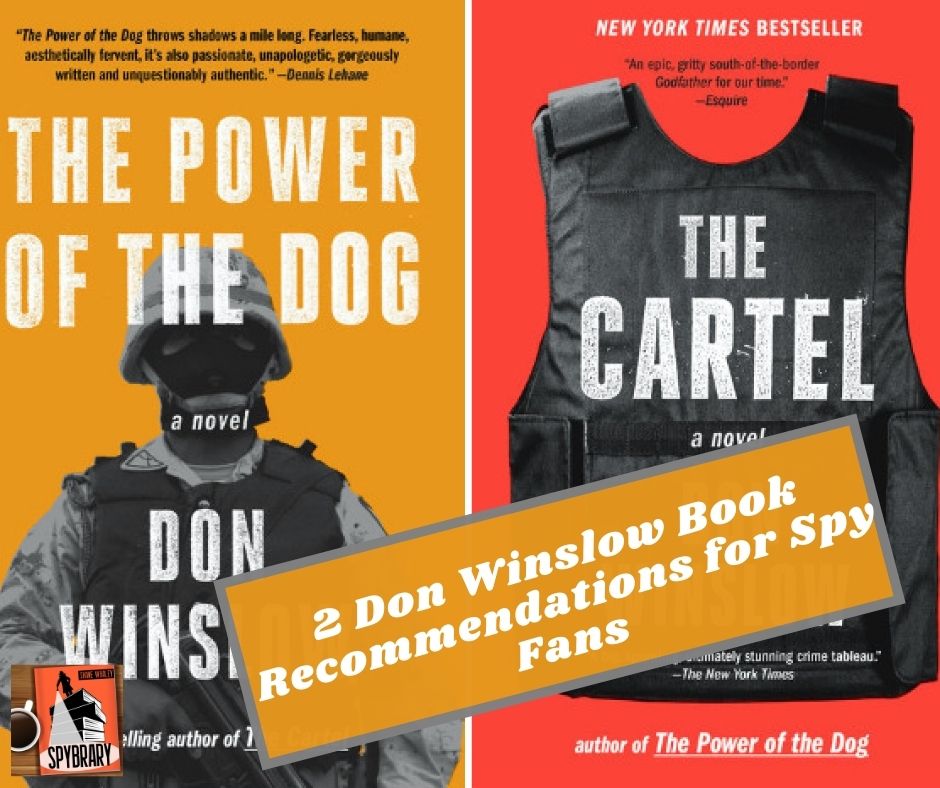
Today we decode a brush pass transmission sent in by Australian author and Spy Book fan, Aiden L Bailey. He gives us his brush pass spy book review of The Power of the Dog and The Cartel by Don Winslow and tells us why he thinks spy fans will enjoy these two Don Winslow novels.
Aiden also shares his thoughts on the various sub-genres that make up the spy genre and why Don Winslow fits both the cerebral and action spy genres.
Perhaps you like cerebral Spies, or maybe action Spies are more your style? Perhaps you like historical spy fiction, or your tastes lead more to the modern era.
aiden bailey
Well, can I suggest The Power of the Dog and The Cartel? These novels will surely cater to anyone’s tastes, and certainly had enough espionage elements to keep an avid spy fan like me interested from start to finish.
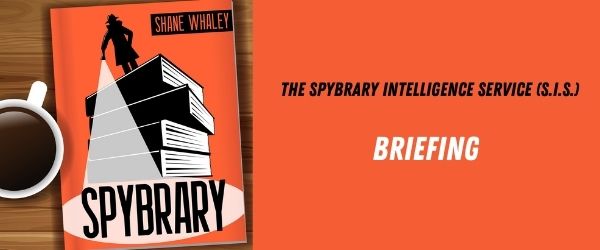
Join the SIS – Spybrary Intelligence Service and never miss an important spy book, movie, or TV story ever again.
Let Spybrary curate the best, most relevant Spy book, TV and Movie news for you.
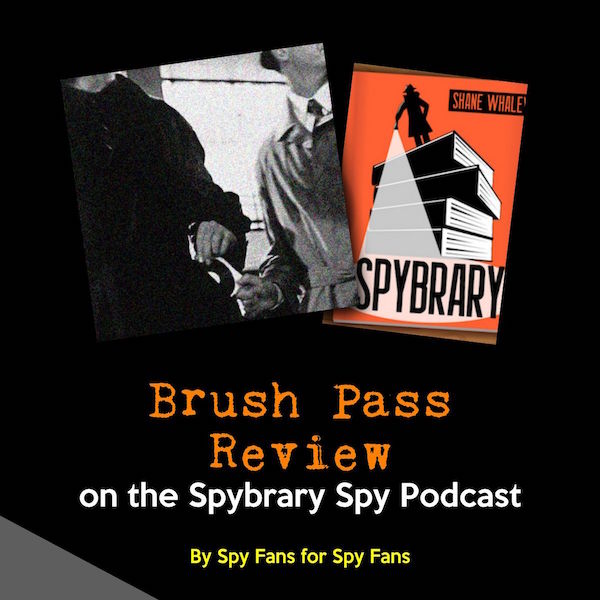
Can you pull off a Brush Pass? Send in your review to Shane@spybrary.com.
Brush Pass reviews are not literary criticism. Imagine telling a friend about a book you just read and why they should (or should not) read it. Record it on your phone and email it over to me. Brush Pass Spy Book reviews are some of our most popular episodes, why not give it a try and send us one in?
The Spybrary Facebook Group – tell us what you thought of today's Brush Pass Spy Book review.
Don Winslow Author Website: http://don-winslow.com/
The Power of the Dog Series (US): https://www.amazon.com/gp/product/B07SDQXDHF
The Power of the Dog Series (UK): https://www.amazon.co.uk/gp/bookseries/B010SECJRE/
Aiden L Bailey Author Website: https://aidenlbailey.wordpress.com/
Aiden L Bailey on Amazon (US): https://www.amazon.com/Aiden-L-Bailey/e/B01KHZFHBO
Aiden L Bailey on Amazon (UK): https://www.amazon.co.uk/Aiden-L-Bailey/e/B01KHZFHBO
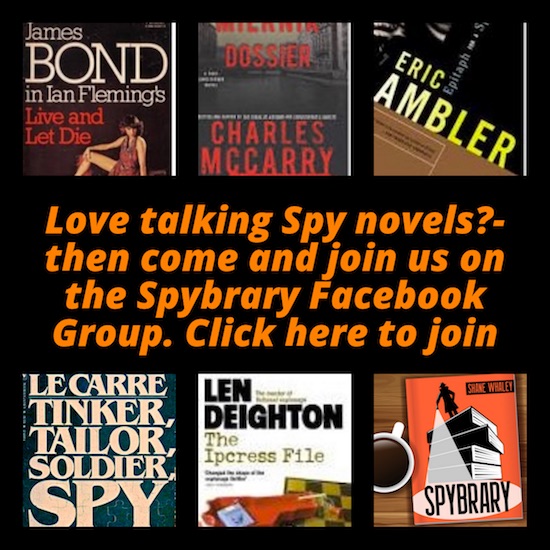
TRANSCRIPT
Hello spy fans, Aiden L Bailey here with my Brush Pass review of Don Winslow’s The Power of the Dog and The Cartel for Spybrary.
Winslow’s epic novels cover the Mexican War on Drugs over a forty-year period from the formation of America’s Drug Enforcement Administration, or DEA, in 1975, through to the modern era.
There is a third book in the series, The Border, but I haven’t read that one yet and haven’t included it in this review.
As an espionage thriller author, myself, I’m always looking for great modern spy novels to inspire me, and I discovered these books through the recommendations made by various spy fans on the Spybrary Facebook page.
I’m glad I picked up these novels, because I found them to be one of my most enthralling reads of late, despite the 415,000 words it took to get there. Both books are rather long, but don’t let that stop you from enjoying them.
For me, I break spy fiction into two generalised eras and two generalised subgenres, which helps me decide if a particular novel will appeal to me, and hopefully, these classifications will help you too.
The two eras are the now historical period of the Cold War explored by spy authors such as Ian Fleming, Len Deighton and Robert Ludlum, a period that commenced shortly after the end of the Second World War, and essentially ended in 1989 with the fall of the Berlin Wall.
The second era of spy fiction is a modern setting predominately focused on a world dominated by the War on Terror. A period that essentially emerged from the Twin Tower bombing in New York in 2001, and is a genre popularised by authors such as Vince Flynn, Mark Greaney and Will Jordan.
As for subgenres of spy fiction, I essentially divide into two broad categories, Cerebral Spy and Action Spy.
Cerebral Spy focuses more on intellect-style storytelling, with characters who use their brains rather than their muscles, who enact devious schemes, deceitful manipulations and lay elaborate traps for their enemies rather than relying on direct confrontation and military action. Good examples of such characters include Bernard Samson, Arkady Renko and Jack Ryan (although they do delve into violence at times).
Action Spy is more of a lone hero type and good examples are Mitch Rapp, Court Gentry the Gray Man, Vanessa Michael Munroe or Victor the Assassin, who operate as efficient killing machines that bring brutal justice to the world through direct action (although they do delve in intellectual games of manipulation).
I believe all four categories make up the key important subgenres to the spy genre, and each has merits and offers exceptional works for readers to discover and enjoy, whatever your tastes.
But I bring up these categories because I find Don Winslow’s novels kind of fits right in the middle of the two eras and two genres, and therefore I asked myself as I was reading The Power of the Dog and The Cartel, does this make it the perfect spy series catering for all tastes?
Between the Cold War and the War on Terror, there was this period called the 1990s when the greatest risk facing spies seemed to be Latin American drug cartels. This is The Power of the Dog and The Cartel. Many spy movies of the 1980s and 1990s, including Licence to Kill and Clear and Present Danger focused very much on this threat.
I suppose I should talk about what Winslow’s books are about.
The story-telling style is a mixture of organised crime fiction, police procedural, intelligence operations, special operations action and epic historical fiction similar to James Clavell or Leon Uris, and mixes all genres in a perfect balance. The books feel long, but never did I think of stepping away from them.
The main character in the series, Art Keller, is a half-Mexican, half-American CIA veteran of the Vietnam War who turns DEA agent. He’s an honest man in a morally, politically and brutally corrupt world, driven to bring down a powerful Mexican drug cartel boss, Adan Barrara. And we discover how he will do this over the course of two novels.
Keller is suitably motivated because early on Barrara brutally tortures and murders Keller’s best friend, and at the start of Keller’s DEA career, tricks Keller into establishing the Barraras as Mexico’s most powerful drug cartel.
What I like about Keller is his perfect blend of Cerebral and Action Spy. Keller is capable of concocting and manipulating into being the most daring and dazzling schemes to bring down his enemies, and do so from way back in the shadows. And yet when he is confronted with direct violence, he is a man of brutal action, able to act calm under pressure and bring calculated life-ending moments to his enemies.
What many Cerebral Spy authors fail to understand is that most readers want a hero that will fight for what is right. Clever manipulation and tricking your enemies into becoming the source of their own downfall is all well and good, but if it does nothing to bring about a better world, what has that Cerebral Spy actually achieved? Well, in these books Keller knows he’s fighting a losing battle, American’s will always pay for illicit drugs and users don’t care how many people had to die to bring them their highs, but Keller knows if he doesn’t fight, the cartels will continue to act with impunity, and bring Mexico into a full totalitarian police state. It’s fighting a tide, but every bucket of water thrown back counts for something.
What many Action Spy authors fail to explore is the psychological and emotional impacts that a violent life brings to a hero of this architype, but not Winslow. Keller internalises his rage and fear, focuses only on his job so he doesn’t have to confront the violence and sadistic impacts that his career has subjected him to, but this has consequences, because trauma always has a way of manifesting itself.
Keller’s relationship with his wife and children fails. He is an outsider within the DEA despite his many operational successes. He can’t sleep most nights and he only gets through each day by not giving up on his ultimate goal; bringing down the Barraras.
And into the mix Winslow throws in Keller’s mixed race, half-Mexican and half-American, which means not through his own choice but by the attitudes and prejudices of the people around him, Keller is made into an outsider. Racism is prevalent on both sides of the Border.
Reading these books, I was constantly surprised by the clever detail Don Winslow includes in his narrative, describing in detail how the War on Drugs grew into the massive and violent network of misery and money that it is today. You can see the author has not skimped on research, and my own research into the books revealed that Winslow undertook six years of study to prepare for these books, including several trips to Mexico for first hand experience on the locations and culture.
The Mexican War on Drugs has cost hundreds of thousands of lives in Mexico alone, and is a multi-billion-dollar business. I’ve seen brutality in spy novels often enough, but nothing like this. Every chapter brings a teeth-clenching slaying, torture or rape scene, until you reach a point where you become desensitized to it all. But I think that is the point. Winslow wants you, as the reader, to understand, this is normal behaviour in the Cartels, and it is almost normal behaviour for the DEA agents who will stop at (almost) nothing to bring these cartels down.
Some people have criticised Winslow for his betrayal of woman, but like all his characters his women are masterly developed and unfortunately, are mostly victims, even those women who make a stand for themselves and what they believe in. This is a brutal world where only the most sadistic and terrifying men survive, and that means they must display their masculinity and brutality at every possible moment. If that means treating women as baby producing wives, prostitutes or mistresses… Well, that’s all these macho men can see women as. They don’t have the imagination for anything else.
Winslow explores many characters and many story arcs in each novel, establishing heroes and villains alike, so that when they come together in conflict, multiple points of view and conflicting moralities and perspectives are easy to understand. Think Game of Thrones, but the various competing Drug Cartels instead of royal houses. Women are treated the same in both worlds.
What also elevated these novels above the norm Awas Winslow’s ability to portray a sense of time, place and culture. His descriptions of Mexican life, from Catholicism as the foundation of family and religious life, to cultural events such as the Day of the Dead, the Mexican City earthquake of 1985, the various geographies and climates of Central America, and the Aztec and Mayan origins of the land, bring a life to the multi-layered story arcs that not all spy writers know how to do.
Perhaps you like Cerebral Spies, or maybe Action Spies are more your style. Perhaps you like historical spy fiction, or your tastes lead more to the modern era. Well, can I suggest The Power of the Dog and The Cartel? These novels will surely cater to anyone’s tastes, and certainly had enough espionage elements to keep an avid spy fan like me interested from start to finish.
I’m Aiden L Bailey, author of the forthcoming action espionage thriller series The Trigger Man, out in 2021. You can find out more about me at my website, www.aidenlbailey.com.
Thanks for listening to my Brush Pass review of Don Winslow’s epic The Power of the Dog and The Cartel, focused on the brutal Mexican War on Drugs. I certainly walked away from these books with whole new ideas on how to tackle my own storytelling in my spy novels. It was a pleasure to read Winslow’s Art Keller series, and a pleasure to share my thoughts on Spybrary. I do hope you give these wonderful books a chance, and read them soon.

